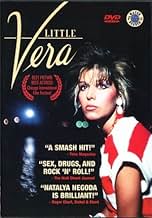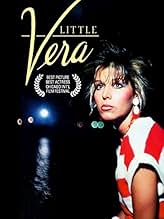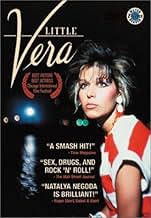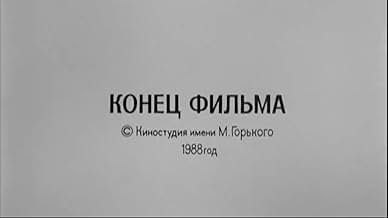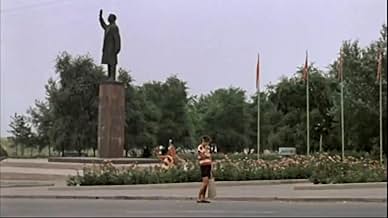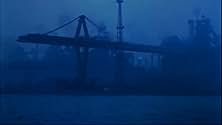NOTE IMDb
6,9/10
2,3 k
MA NOTE
Les frasques de Vera qui habite dans une petite ville industrielle. Vera a quitté l'école jeune et fait les 400 coups, suivant ses désirs afin d'oublier les disputes familiales, son père alc... Tout lireLes frasques de Vera qui habite dans une petite ville industrielle. Vera a quitté l'école jeune et fait les 400 coups, suivant ses désirs afin d'oublier les disputes familiales, son père alcoolique et le sombre avenir qui l'attend.Les frasques de Vera qui habite dans une petite ville industrielle. Vera a quitté l'école jeune et fait les 400 coups, suivant ses désirs afin d'oublier les disputes familiales, son père alcoolique et le sombre avenir qui l'attend.
- Réalisation
- Scénario
- Casting principal
- Récompenses
- 7 victoires et 9 nominations au total
Aleksandr Negreba
- Viktor - brat Very
- (as Alexander Alexseyev Negreba)
Aleksandra Tabakova
- Lenka Chistyakova
- (as Alexandra Tabakova)
Gennady Goryachev
- Sledovatel
- (as G. Goryachev)
Vadim Zakharchenko
- Muzhchina v bolnichnoy palate
- (as V. Zakharchenko)
Mariya Khmelik
- podruga Viktora
- (as M. Khmelik)
Maksim Nayrabe
- brat Lenki Chistyakovoy
- (as Maxim Nairabe)
Avis à la une
Forget every spy movie you've ever seen - this is what life was like in the USSR, and still is in many places in Russia and the ex-Soviet countries. Vera dreams of life of leisure, as she imagines the West to be; her reality is very different, with a bitter mother, a violent father, and the ever-present alcohol. And her prospects for the future are not much better. She finds a man and they try to patch up a life together, but he is afflicted by the same environment, both socially and physically - the scenery in this movie is brilliant, sitting comfortably in the company of post-apocalyptic movies but obviously done with no special effects; they have just walked in and shot whatever happened to be in front of the camera.
Forget your stereotyped, cold Russians of spy movies. This is the Real Deal: people are passionate, vibrant, and present in a way you'll never see in a drama from the West.
Forget your stereotyped, cold Russians of spy movies. This is the Real Deal: people are passionate, vibrant, and present in a way you'll never see in a drama from the West.
What I found so interesting about this film was the incredible contrast of subject matter and mood between this film and the Russian films that came before it.
A product of Glasnost, in an attempt to modernize the cinema and remove censorship, allowed for Russians to be shown realistically and their individual stories be told instead of a happy Russian body of agreeable people.
The film addresses the reality of dysfunctional families, crammed into small apartments, alcoholism, poverty, and young adults confused and rebelling against authority.
Little Vera depicts Vera and her family with attitudes of hopelessness, apathy and loneliness.
I liked the movie for the fact that it is ground breaking showing problematic issues and stories of individuals that were never or could never be shown on screen previously under oppressive governments.
I personally wouldn't watch it again. Its worth watching once! Once was enough for me because I hated all the characters and was left depressed after watching a movie where people are constantly fighting but that- I think is the point of the film.
A product of Glasnost, in an attempt to modernize the cinema and remove censorship, allowed for Russians to be shown realistically and their individual stories be told instead of a happy Russian body of agreeable people.
The film addresses the reality of dysfunctional families, crammed into small apartments, alcoholism, poverty, and young adults confused and rebelling against authority.
Little Vera depicts Vera and her family with attitudes of hopelessness, apathy and loneliness.
I liked the movie for the fact that it is ground breaking showing problematic issues and stories of individuals that were never or could never be shown on screen previously under oppressive governments.
I personally wouldn't watch it again. Its worth watching once! Once was enough for me because I hated all the characters and was left depressed after watching a movie where people are constantly fighting but that- I think is the point of the film.
It's alarming, to say the least, how little the English speaking world knows about Russia's past. Everyone keeps saying Russia, but I grew up in the Soviet Union, and I can't really call it an exclusively Russian film like everyone else. Ironically, this movie was filmed in Zhdanov(Mariupol), which is now a part of Ukriane. The director chose this city because that's where he was from and he wanted to show the reality of life there. This city always been a ghetto. Now it's even worse, since that part of Ukraine is engulfed in a civil war. So the hopeless openededness of this film was right on point. Unfortunately, I have a feeling the main character would most likely die sometime in the 90's to early 2000's. Even moving wouldn't help, cause the whole area of the former Soviet Union later became a total cesspool of violent crime and drug/alcohol addiction.
During the late 80's, right before the Soviet Union collapsed, there was a plethora of similar films, but for some weird reason only this one was known outside of the country. There were films with worse sex scenes before and after this one, and unlike many other countries, there was no censorship, so TV was full of nudity at the time. So I am really confused why this was praised for a "sex scene", or "rock n' roll"(?!). This film is none of that. This era of Soviet film was actually called "Chernuha" which translates as darkness, despair, gritty. Films during this time were full of realism, had this art-house vibe and yet very genuine acting, and always had a somewhat hidden psychological or philosophical dilemma in it. Sounds like Oscar's winner Moonlight. Indeed, if Moonlight took place in the 80's Soviet Union, and instead of drugs people were drinking, it would fit right in. Some scenes are almost identical with those Soviet films. (i.e. filming a pot on a stove for a good 1 minute or so, or a character is staring at something or thinking for a long time.) I actually seen a lot of them when I was a kid, but it took me decades to watch most of them again. Many never been preserved and therefore are in a very bad shape and some I still can't find, so they were pretty much lost during the switch to the digital format. During the 90's, Russian society rejected everything from the Soviet era. Even this film would have probably been lost if it wasn't for this unusual international hype about it because of some naive sex scene.
There are some odd moments in the film that I only noticed when I watched it as an adult. There is really good and rare collector's items Italo-Disco(CC Catch) blasting from TV during the house party. A phenomena of an underground music style in North America that was only played at gay clubs, was actually a mainstream thing in the Soviet Union. Then there is a clear pedophile situation at a cafe between a man and a very young girl. Another strange scene is where Vera gets accidentally hit by a pot in the head by her drunk girlfriend with a black kid. It was also sort of disturbing to see how she was calling him names and screaming at him when she was drunk, which followed by a scene where he was alone watching a silly cartoon on TV about staying away from Africa because it has dangerous animals, while it's very obvious that life for this kid with black skin in that hell hole of a town is probably worse than being in an African jungle...
The film is as real as it gets. The life was like this for most of the Soviet Union back then. So I definitely would recommend it as a learning artifact. Also Vera means hope. So the name of the film in Russian means also "A very little hope".
During the late 80's, right before the Soviet Union collapsed, there was a plethora of similar films, but for some weird reason only this one was known outside of the country. There were films with worse sex scenes before and after this one, and unlike many other countries, there was no censorship, so TV was full of nudity at the time. So I am really confused why this was praised for a "sex scene", or "rock n' roll"(?!). This film is none of that. This era of Soviet film was actually called "Chernuha" which translates as darkness, despair, gritty. Films during this time were full of realism, had this art-house vibe and yet very genuine acting, and always had a somewhat hidden psychological or philosophical dilemma in it. Sounds like Oscar's winner Moonlight. Indeed, if Moonlight took place in the 80's Soviet Union, and instead of drugs people were drinking, it would fit right in. Some scenes are almost identical with those Soviet films. (i.e. filming a pot on a stove for a good 1 minute or so, or a character is staring at something or thinking for a long time.) I actually seen a lot of them when I was a kid, but it took me decades to watch most of them again. Many never been preserved and therefore are in a very bad shape and some I still can't find, so they were pretty much lost during the switch to the digital format. During the 90's, Russian society rejected everything from the Soviet era. Even this film would have probably been lost if it wasn't for this unusual international hype about it because of some naive sex scene.
There are some odd moments in the film that I only noticed when I watched it as an adult. There is really good and rare collector's items Italo-Disco(CC Catch) blasting from TV during the house party. A phenomena of an underground music style in North America that was only played at gay clubs, was actually a mainstream thing in the Soviet Union. Then there is a clear pedophile situation at a cafe between a man and a very young girl. Another strange scene is where Vera gets accidentally hit by a pot in the head by her drunk girlfriend with a black kid. It was also sort of disturbing to see how she was calling him names and screaming at him when she was drunk, which followed by a scene where he was alone watching a silly cartoon on TV about staying away from Africa because it has dangerous animals, while it's very obvious that life for this kid with black skin in that hell hole of a town is probably worse than being in an African jungle...
The film is as real as it gets. The life was like this for most of the Soviet Union back then. So I definitely would recommend it as a learning artifact. Also Vera means hope. So the name of the film in Russian means also "A very little hope".
10fred3f
It is difficult, today and in the US, to understand this movie. We have nothing, really, to compare it with. Here is an attempt at comparison: It is as if during the last years of Saddam's rule, a filmmaker in Iraq were somehow able to make a film, which, for the first time ever, showed life as it really was lived in that country. The life of ordinary young girl, with all the terror and the repression full blown. Then the film was exhibited freely in Iraq. If you could imagine that unlikely event, then you might have an idea of what went on with this film in the last few years of the Soviet Union. Prior to this film, Soviet cinema was highly censored. Soviet movies would only show an ideal life in the worker's paradise. Then suddenly this. The alcoholism, the random sex, the ugly wasteland that was the Soviet city, the choking pollution, the proletariat victimizing each other and themselves, the utter hopelessness - it is all there. People were stunned. Soviet women would often weep during the showings. Many would say that this is the story of their lives. It was a cultural earthquake the like of which filmmakers only dream of accomplishing. It undoubtedly hastened the breakup of the Soviet Union.
Reading the reviews here, I can see that few understand this film. One says it was groundbreaking because it contained real sex. To the Soviet viewers at the time, the sex was a minor event compared to fact that it portrayed reality for the first time in Soviet cinema.
Others compare it to current films such as "As Good as it Gets" Might as well compare Homer's Illiad to the latest John Grissam novel. They simply do not compare. This is not just a film, this is was a social document, and a transforming social force. It needs to be viewed that way or you will not understand the film.
Other reviewers see it as a film about a dysfunctional Russian family. One even says that it is difficult to feel sorry for Vera because she keeps coming back to her family. The point is that Vera and her family are symbols for all of Soviet life. There was nowhere else to go, because the family down the block and in the next town were the same. This was life in the Soviet Union for most people.
This is a film that can be viewed on many levels: as a drama it traces the landscape of despair, as a social document it shows the living conditions of the time, as a political document it shows the attitude of the people and many of the reasons for the break-up of the Soviet Union, and as a moral document it shows the evils of a dictatorship that is out of control, and the cruelties that victims will practice on each other.
Little Vera clearly shows the human toll that Socialism eventually takes on its victims, despite any good intentions that system may have. In doing so it helped end the Soviet regime thus contributing to one of the major changes in modern history. This film achieves what only a few films have ever accomplished. It is not only an stunning representation of history but it also become a force in that shaped history.
Reading the reviews here, I can see that few understand this film. One says it was groundbreaking because it contained real sex. To the Soviet viewers at the time, the sex was a minor event compared to fact that it portrayed reality for the first time in Soviet cinema.
Others compare it to current films such as "As Good as it Gets" Might as well compare Homer's Illiad to the latest John Grissam novel. They simply do not compare. This is not just a film, this is was a social document, and a transforming social force. It needs to be viewed that way or you will not understand the film.
Other reviewers see it as a film about a dysfunctional Russian family. One even says that it is difficult to feel sorry for Vera because she keeps coming back to her family. The point is that Vera and her family are symbols for all of Soviet life. There was nowhere else to go, because the family down the block and in the next town were the same. This was life in the Soviet Union for most people.
This is a film that can be viewed on many levels: as a drama it traces the landscape of despair, as a social document it shows the living conditions of the time, as a political document it shows the attitude of the people and many of the reasons for the break-up of the Soviet Union, and as a moral document it shows the evils of a dictatorship that is out of control, and the cruelties that victims will practice on each other.
Little Vera clearly shows the human toll that Socialism eventually takes on its victims, despite any good intentions that system may have. In doing so it helped end the Soviet regime thus contributing to one of the major changes in modern history. This film achieves what only a few films have ever accomplished. It is not only an stunning representation of history but it also become a force in that shaped history.
One of the major aspects of "Malenkaya Vera" (called "Little Vera" in English) is that it was the first movie from the Soviet Union that featured a sex scene, albeit a short one. The title is important: Vera is the Russian word for "faith", identifying that punk Vera (Natalya Negoda) has little faith in the Soviet system. And as the movie shows, there's not much faith to be had in it. The opening scene shows the bleak industrial town of Zhdanov, nearly a hell on earth. When Vera's lover Sergei (Andrey Sokolov) moves in with her family, it leads to some unexpected events.
Like in many Russian movies, people's names describe their characters. For example, there's Viktor (remember that "victor" means winner). All in all, this is a good look at the Soviet Union while it was collapsing - and we can see why it was collapsing. Really good.
Like in many Russian movies, people's names describe their characters. For example, there's Viktor (remember that "victor" means winner). All in all, this is a good look at the Soviet Union while it was collapsing - and we can see why it was collapsing. Really good.
Le saviez-vous
- AnecdotesThis was the first Soviet film to depict graphic sexual intercourse on screen.
- Bandes originalesHeaven And Hell
(uncredited)
Written by Dieter Bohlen
Performed by C.C. Catch
Produced by Dieter Bohlen
[plays during playback of the video clip of the same name C. C. Catch]
Meilleurs choix
Connectez-vous pour évaluer et suivre la liste de favoris afin de recevoir des recommandations personnalisées
- How long is Little Vera?Alimenté par Alexa
Détails
Box-office
- Montant brut aux États-Unis et au Canada
- 1 262 598 $US
- Week-end de sortie aux États-Unis et au Canada
- 23 950 $US
- 16 avr. 1989
- Montant brut mondial
- 1 262 598 $US
Contribuer à cette page
Suggérer une modification ou ajouter du contenu manquant

